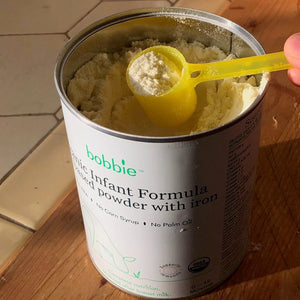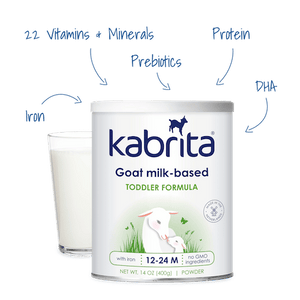Here’s the Deal with Goat Milk Baby Formula
1) Is goat milk healthier than cow milk? What are the benefits of goat milk baby formula?
Goat milk can be better, yes.
In basic nutritional terms, goat milk and cow milk are pretty similar. Goat milk tends to be higher in several vitamins and minerals. Cow milk is higher in vitamin B12 and has significantly more folic acid than goat milk.
When it comes to formula, these differences don’t matter much. All formulas have nutrients added to make up for whatever the milk they’re based on might be lacking. And all formula is made to mimic human milk as closely as possible.
What’s most important is how the animals—be they cows or goats—are fed and raised. I prefer milk that is organic, or at least non-GMO, and from animals that are pastured.
It’s also worth noting that animal studies and some studies on humans suggest that the vitamins and minerals in goat’s milk might be more readily absorbed than those in cow milk. Basically, goat milk in its natural state seems to be closer to human milk than cow milk is.This is one of the reasons some parents prefer goat milk formulas.
Whichever formula you choose, you should always use a water filter to remove chlorine (carcinogenic) at a minimum. Here’s more on why you should get a filter and which ones I like.
2) Is goat milk easier to digest than cow milk?
Yes. One of the big benefits of goat milk baby formula is that it’s easier to digest. But it’s not for everyone.
Since goat milk protein is naturally easier to digest than cow milk protein, babies with a sensitivity to cow milk may do better with goat milk. The composition of the proteins and fats in goat and cow milk varies enough to make goat milk less problematic and, overall, more digestible. For babies, whose immune and digestive systems are still developing, this could make a big difference. However, for those with a true cow milk protein allergy, goat milk products are not recommended as there is a high risk of cross reactivity. Any baby with a milk allergy should be under the care of a pediatrician before trying goat milk formula.
- The proteins in goat milk digest faster and more easily than those in cow milk. This is in part due to alpha-S1 casein, which is significantly less in goat milk protein. (This type of protein is one that tends to be problematic for some people when they digest cow milk.) Instead, the primary type of casein in goat milk is more similar to what’s found in human milk. It's worth noting that the fats in goat milk also digest faster and more easily.
- Goat milk has less lactose than cow milk, but it might still be an issue for people with lactose intolerance. Carbohydrates are a very important energy source for babies, so all formulas are required to add more. All of the goat milk formulas I reviewed, except for Sammy’s Milk, add more lactose as carbohydrate source. True lactose intolerance in small children is uncommon and therefore lactose is the preferred carbohydrate source for most babies.
You can read more about the digestibility of goat milk here.
3) Why aren’t all of these goat milk formulas organic?
Of the goat milk formulas I researched, only the European brand--Holle--is certified organic. (And this is according to European standards, which are actually stricter than American standards!).
Here in the United States, there isn’t much certified organic goat milk being produced. There are multiple reasons for this phenomenon, but that’s beyond the scope of this post.
If you want an organic goat milk formula, my pick is Holle.
Of the non-organic brands...
- Kabrita uses high-quality, pasteurized Dutch goat milk from a co-op of family farms in the Netherlands.
- NANNYcare milk is from goats that are mostly pasture fed in New Zealand, and raised without the use of hormones; antibiotics use is minimal.
- Sammy's Milk uses milk from goats that are antibiotic and hormone-free.
4) Which goat milk formula is best? Is it worth switching baby formula?
We all know breast milk is better than formula, be in from a goat or a cow, and even if you’re choosing an organic baby formula. There’s no such thing as a perfect formula, but the best brands get really close--close enough that you should feel confident feeding the formula to your infant or toddler.
When looking for goat milk formulas to recommend, I considered several factors:
- the quality and purity of the goat milk (organic/non-GMO/pastured)
- the type and purity of of added carbohydrates (sugars)
- the type and purity of added vegetable oils
- the presence of hexane-extracted DHA/ARA
- the presence of problematic synthetic preservatives and nutrients
For more about my rationale behind these factors and why I think they matter when selecting an organic baby formula, see our Safe Infant Formula Guide.










